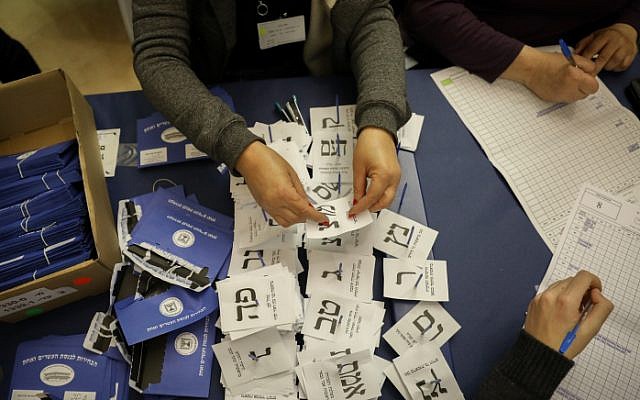Two days before deadline, Likud and Blue and White agree on prospective date, a Monday, which must still be approved by Knesset

Blue and White and Likud have agreed that the next round of elections will be held on Monday, March 2, 2020, barring a last-minute coalition deal in the next two days.
The Knesset is expected to dissolve on Wednesday night, confirming the failure of both Prime Minister Benjamin Netanyahu and Blue and White leader Benny Gantz to form a governing coalition following the inconclusive September elections.
If no lawmaker manages to get the support of at least 61 members of the 120-strong Knesset by Wednesday — and no candidate appears poised to do so — elections will be called for the third time in less than a year. The months-long political paralysis has continued since a previous round of voting in April failed to result in a majority government.
The proposed election date must clear three Knesset plenary readings to be approved, though even with just Likud and Blue and White’s support it already has a parliamentary majority.
Knesset Speaker Yuli Edelstein said Monday the three votes would be scheduled for Wednesday.
“Even when it seems that there is no chance of preventing these costly and unnecessary elections, we will not begin this legislative process before Wednesday, to allow the party leaders to come to their senses in the eleventh hour, a moment before it’s too late,” said Edelstein.
The unprecedented third round of elections in under a year will also be held on a Monday, a first for Israel, which generally holds the national vote on a Tuesday.
The change was due to a series of anniversaries and holidays that fall out on March’s Tuesdays, including a memorial day for soldiers whose burial sites are unknown, the Purim carnival, and the death anniversary of a Hasidic sage that sees a large ultra-Orthodox pilgrimage to his Polish hometown.

On Sunday, Hebrew media reports said Netanyahu’s Likud was seeking the latest possible date for the elections, while Blue and White sought the earliest.
Following September’s vote, Netanyahu and Gantz publicly supported a unity government of their parties under a power-sharing deal outlined by the president, but neither would bend on who would serve as premier first; the prime minister insisted on negotiating on behalf of his allied bloc of 55 MKs; and Blue and White ruled out serving under Netanyahu due to the criminal charges against him.
Both leaders have traded blame over the logjam.
Netanyahu will be facing a challenge within his party — Likud MK Gideon Sa’ar will by vying for the Likud leadership — and will campaign in the shadow of criminal charges against him, announced last month by the attorney general, in three corruption probes.
On Sunday, Supreme Court Justice Neal Hendel was appointed to head the Central Elections Committee, replacing Hanan Melcer, who presided over the previous two elections.
As reported by The Times of Israel
